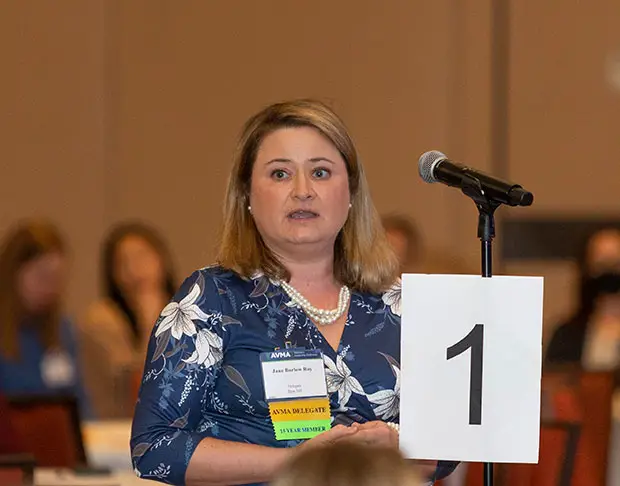Veterinary practices looking to improve their workplace culture need look no further than the AVMA and other organizations, which offer a wealth of information in this area.
Members of the AVMA House of Delegates were asked to widely share information on these existing resources to their staff and constituents after a wide-ranging discussion regarding the impact of workplace culture on employee retention and well-being. Members deliberated on the topic on Jan. 6 during the regular winter session of the HOD, held in conjunction with the AVMA Veterinary Leadership Conference in Chicago.
Many of the resources developed by the AVMA work well with individuals and teams—so they are efforts a team could undertake together and then discuss, and work together to implement the ideas in their workplace.

The AVMA offers the following resources for personal and workplace well-being:
- The Journey for Teams program, which offers opportunities to provide more diverse, equitable, and inclusive workplaces.
- Continuing education at the AVMA Convention, at the AVMA Veterinary Leadership Conference, and on AVMA Axon, the AVMA’s online education platform.
- The Workplace Wellbeing Certificate Program, which teaches skills to the veterinary team to support a culture of well-being in the workplace.
- Training in suicide prevention, which teaches people how to recognize that someone might be suicidal, start a dialogue, and guide the person to professional help.
- The Brave Space Certificate Program, which empowers veterinary professionals to turn workplaces into environments where individual differences are recognized and valued.
- The Train the Trainer Workshop, which offers instruction on how to become an educator in workplace communication skills that support well-being.
- A new toolkit to help practices manage their reputations and combat cyberbullying.
The new toolkit was announced during the AVMA Veterinary Leadership Conference. Developed with an educational grant from Banfield Pet Hospital, it is meant to provide guidance on preventing and combating cyberbullying, responding to and recovering from an incident, and supporting the physical and mental well-being of staff members.
It’s OK to seek help
During discussion at the Veterinary Information Forum, Dr. Jennifer Glass, Idaho delegate, recounted suggestions from her constituents for new resources from the AVMA, such as advice for deescalating angry clients. In that vein, the AVMA—in cooperation with Mars Veterinary Health and Banfield Pet Hospital and supported by an industrywide working group—has been developing a list of shared expectations and responsibilities for veterinary teams and clients. That resource will be unveiled in the coming weeks. In addition, the AVMA offers an on-demand webinar related to this topic.
Veterinarians and veterinary technicians who have left the profession should be part of the effort to improve workplace culture as a way to potentially reengage them, recommended Dr. Cathy Lund, alternate delegate for the American Association of Feline Practitioners.
Dr. Christopher Gargamelli, Connecticut delegate, said his constituents offered a variety of responses to the topic of workplace culture, talking about taking personal responsibility for one’s own wellness, while there is still so much that veterinarians can do collectively for the profession.
The Florida VMA started a member assistance program for veterinary practices, but only about 40 people have used the program, said Dr. Richard Williams, Florida alternate delegate. He said: “I think it goes back to an issue that we very rarely ever address, and that there is, I guess the term would be, a stigma out there, that if you have to ask for help, you’re weak.”
But it’s OK to ask for help, Dr. Williams said. The FVMA program pays for two hourlong sessions with a counselor, and then members can proceed from there.
Dr. Ernest Godfrey, Florida delegate, echoed the sentiment that it’s OK to ask for help. He said his hospital has an employee assistance program and conducts stay interviews with team members.
The profession also needs to focus on workplace culture affecting students in teaching hospitals, suggested Max Paulson, Student AVMA alternate delegate, to make sure new graduates aren’t burned out before they even start practicing.
Dr. Keith Poulsen, Wisconsin delegate, directs the Wisconsin Veterinary Diagnostic Laboratory and teaches at the University of Wisconsin-Madison School of Veterinary Medicine. He said that older veterinarians have to remember that the younger generations are very different. He said, “We can’t just expect what we did, they will do.”
